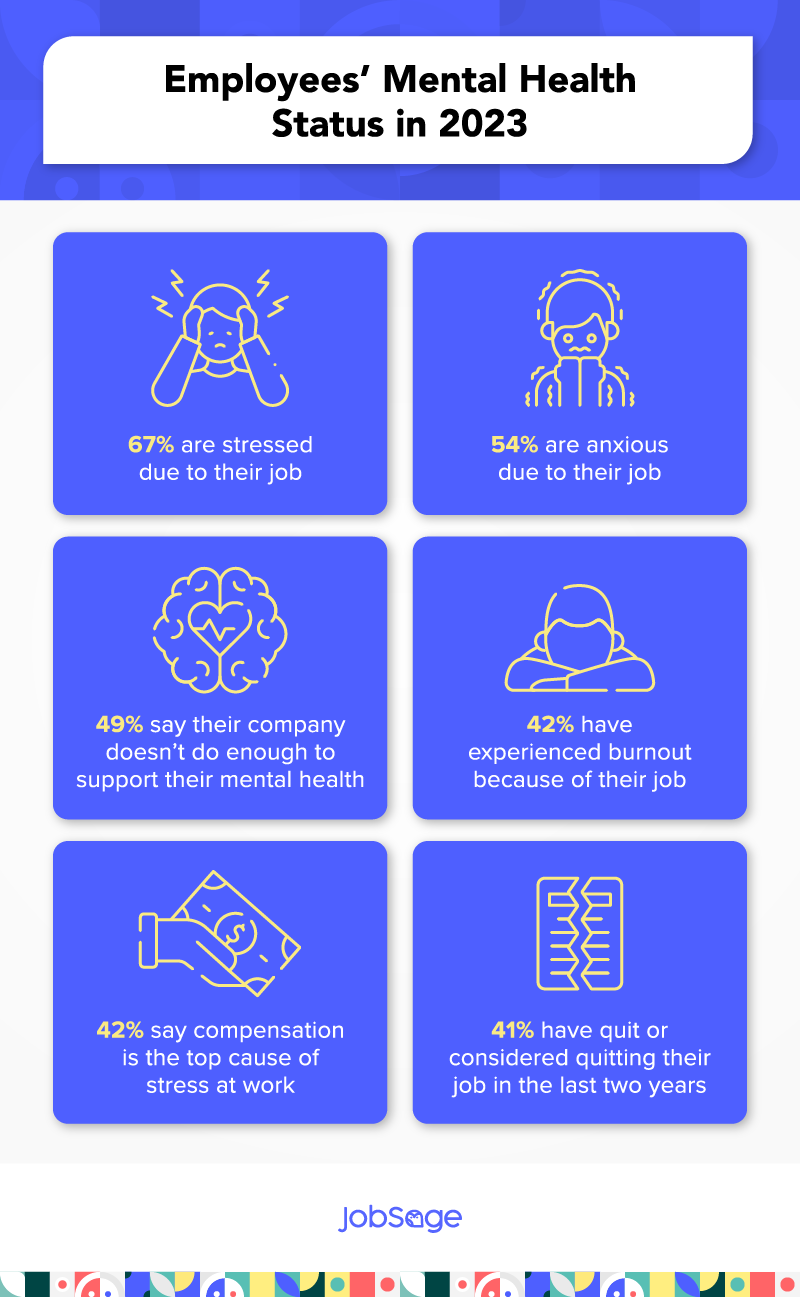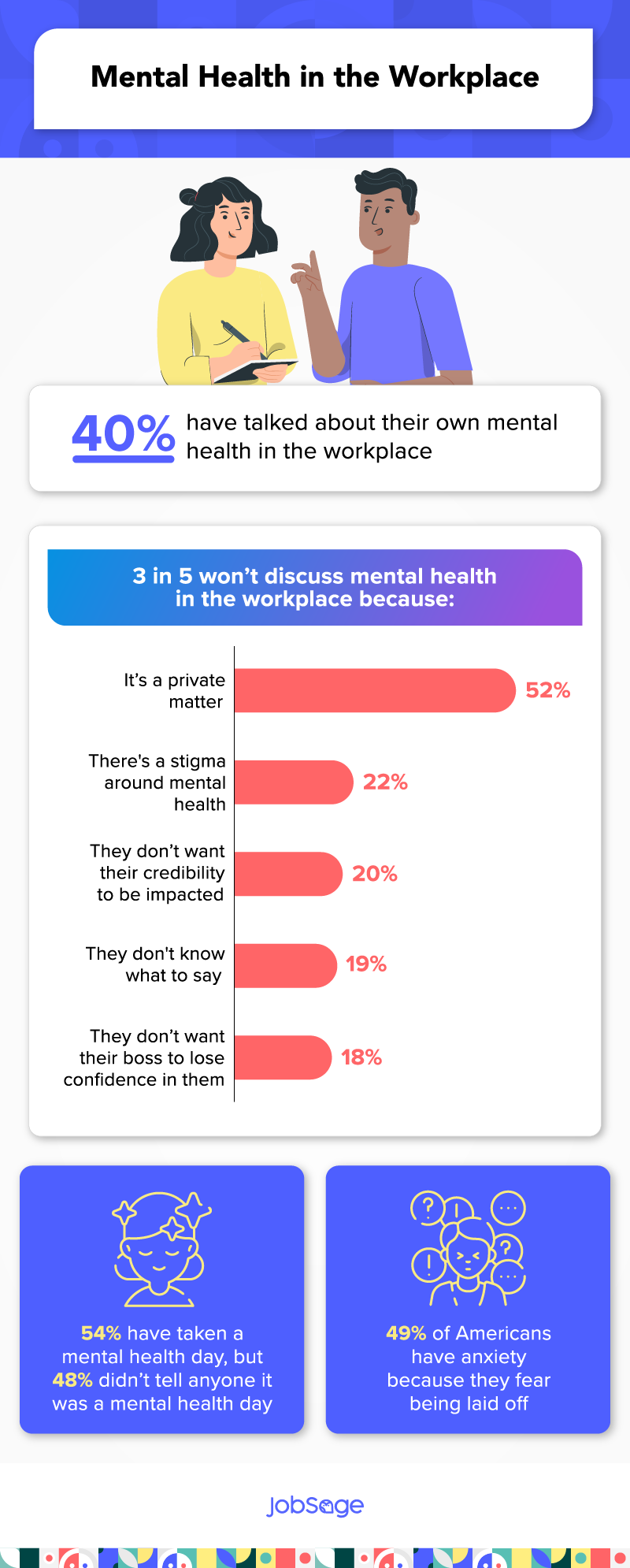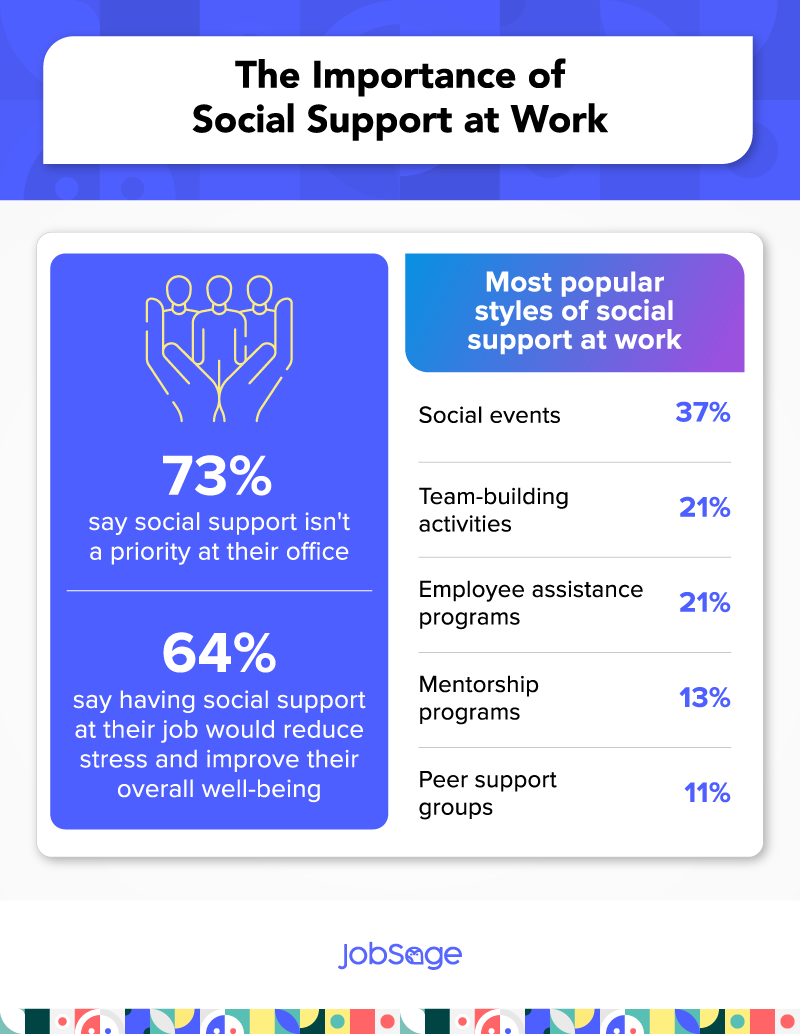Mental health has been a hot topic in recent years, but not everyone is ready to join in on the conversation. Although a big factor that impacts Americans’ mental health is their job, discussing mental health in the workplace is still a taboo topic for some employees. In 2022, we surveyed Americans about mental health in the workplace, during the time of the Great Resignation and coming down from a pandemic.
As we move into 2023, we were curious to know how Americans’ mental health has changed and how their companies support their well-being. To find out how employees are feeling about their mental health and the support they receive from their employer, we surveyed 1,005 Americans. This post reveals how Americans feel about their mental health, how the workplace impacts it and whether companies have done a good job supporting their employee’s needs.

Key findings
- Mental health has prompted 41% of Americans to consider quitting their job.
- Compensation is the top factor of work-related stress in 2023, replacing being overworked in 2022.
- More people experienced burnout in 2023 than in 2022.
- Over half of Americans have taken a mental health day, but 48% didn’t tell anyone it was a mental health day.
Employees are more stressed and anxious in 2023
It’s no secret that the way our job impacts our mental health plays a significant role in the way we feel generally in life. In 2023, 67% were stressed and 54% were anxious due to their jobs. These numbers are up from 2022, when only 55% were stressed and 36% were anxious.
Although more Americans report being stressed and anxious, fewer have quit or considered quitting. The number of people quitting their jobs because of mental health strain — or thinking of quitting — has declined year over year. In 2022, 65% reported they quit or considered quitting at some point during the previous two years. In 2023, that number is down to 41%.
The rate of actually quitting over mental health strain is also down. In 2022, 28% of workers reported quitting a job at some point because of their mental health in the previous two years, and in 2023, that number is down to 10 percent.
Although industries and job descriptions differ, 42% of Americans say compensation is the top cause of stress at their job, followed by 39% saying it’s being overworked. Similar to being overworked, 42% say they’ve experienced burnout because of their job. A new source of work-related stress for Americans in 2023 is the lack of benefits, but people are less stressed about job security in 2023 than they were in 2022.
Along with a higher salary, an increased number of employees wish they had more mental health support: Half say their company doesn’t do enough to support their mental health in 2023, and in 2022 that number was only 20%.

Nearly 1 in 3 wish their employers provided access to online mental health resources
When it comes to their mental health, 1 in 4 people say work is what most negatively impacts it. However, there are ways employers can help. The biggest factor preventing people from using mental health services in 2023 is the cost, so it’s no surprise that nearly 1 in 3 wish their employers provided access to online mental health resources.
When employees struggle with mental health, it impacts them at work physically, the most common change being with their behavior or mood according to 70%. Decreased productivity or performance impacts 56% if they’re struggling with mental health.
Other types of support employees want in 2023 is more time off and a more flexible work schedule. Both of these can promote a better work-life balance, and a better balance is the number one request according to 42% of those surveyed.

Discussing mental health at work in 2023
Talking about mental health in the workplace isn’t something everyone is comfortable with, yet 40% say they have talked about their own mental health in the workplace. For the 3 in 5 who don’t feel comfortable talking about the subject at work, 52% say they don’t because it’s a private matter. The stigma around mental health prevents 22% from discussing it, and 20% don’t want their credibility at work to be impacted.

Mental health days help promote the importance of focusing on one’s mental health and well-being, and 54% say they’ve taken one. Although more than half of employees have taken one, 48% say they didn’t tell anyone it was a mental health day, and 56% wouldn’t feel comfortable admitting to their boss that they needed the day.
Many factors at work can impact employees’ mental health and require that they take a mental health day, including the fear of being laid off. Fearing that they might lose their job causes anxiety for 49% of respondents, depression for 26% and 21% literally lose sleep over it.
Social support and salary ranges
Social support at work refers to the assistance provided by colleagues and supervisors that helps you emotionally or practically at work. This type of support can be presented in many ways, including encouragement, advice, and guidance to name a few. Although 64% say having social support at their job would reduce stress and improve overall well-being, 73% say social support isn’t a priority at their office.
For those who do have social support at work, 37% say social events are the most popular form. Getting together for team building activities and employee assistance programs are the norm for 21%.

Social support isn’t the only thing that can help improve mental health at work. A higher salary can promote better financial security and translate to better mental health. When asked to describe their mental health from extremely good to extremely bad, employees in higher salary ranges tended to describe their mental health as good, versus those in lower salary ranges who described it as okay.
- $100,000 or more: Good mental health
- $75,000 to $99,999: Good mental health
- $50,000 to $74,999: Good mental health
- $35,000 to $49,999: Good / okay mental health (tie)
- $20,000 to $34,999: Okay mental health
- Less than $20,000: Okay mental health
Conclusion
The current challenges of the world have shifted Americans’ mental health, leading to higher levels of stress and anxiety. While employees know how important mental health is to their well-being, over half report that their company doesn’t do enough to support them.
We know finding a company that aligns with your needs is important, and at JobSage we make it possible for you to know how a company supports employees before you even accept the offer. By providing a platform for transparency around workplace topics that matter to you, you can accept your next job offer confident about who you’re signing up to work for.
Methodology
On March 10, 2023, we surveyed 1,005 Americans about how their company supports their mental health. Respondents ranged in age from 18 to 76 years old, and were 49% female, 50% male and 1% nonbinary.
